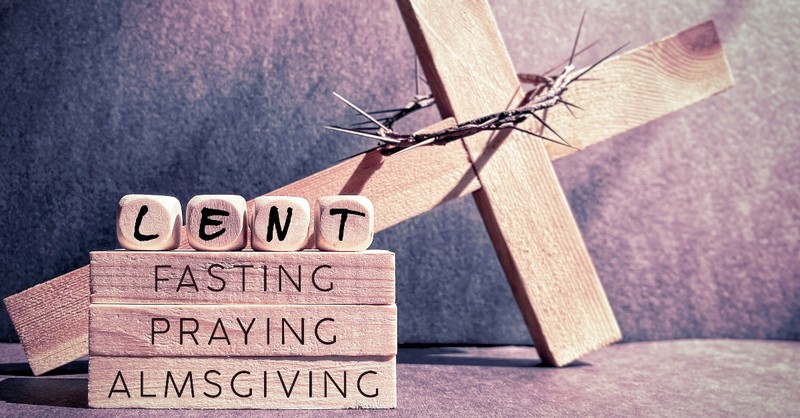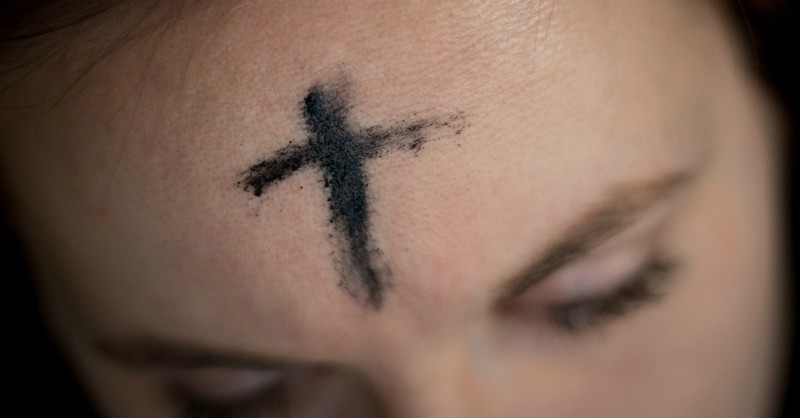
Lent is a period of 40 days of fasting and prayer leading up to Easter. Lent starts on Ash Wednesday and concludes on Holy Saturday, just before Easter Sunday. The word "Lent" comes from the word "lecten" which is Anglo-Saxon meaning "spring" and refers to the lengthening of days.
During Lent, Christians engage in various traditional rituals and practices as a way of preparing spiritually for the celebration of the resurrection of Jesus Christ on Easter Sunday. Fasting during Lent often involves giving up certain foods, activities, or habits as a form of self-discipline and spiritual reflection. Many Christians also attend special worship services, reflect on the significance of Jesus' sacrifice, and seek to grow in their relationship with God during this period. The Lenten season serves as a time of repentance, self-examination, and spiritual renewal in preparation for the joyous celebration of Easter.
The team at Christianity.com has put together a complete Lent guide for you with a full schedule of the key dates and events. Let's answer some questions about when Lent starts, how long lent is, what are Lent's important key dates, and how you can observe lent:
Download your FREE copy of our 40-Day Lent and Easter Devotional - filled with daily Scriptures, reflections, and prayers for the Lent season.

When is Lent 2024?
Lent begins each year on Ash Wednesday, 46 days before Easter Sunday. This year, Lent will begin on Wednesday, February 14th, 2024.
Lent consists of six weeks leading up to Easter and ends either on Maundy Thursday (March 28th, 2024) or Holy Saturday (March 30, 2024), depending on the denomination or tradition you follow.
How long is Lent?
Lent is 40-days long and begins 46 days before the Saturday of Easter weekend (Easter Sunday falls on Sunday, March 31, 2024) but is only observed Monday-Saturday each week because every Sunday is considered a celebration of the Resurrection.
The 40-day duration is symbolic and represents the time Jesus spent fasting in the wilderness before beginning his public ministry.
When does Lent start in 2024?
Lent 2024 starts on “Ash Wednesday,” which is February 14, 2024, and also happens to be Valentine's Day!
Ash Wednesday is the Start of Lent
On Ash Wednesday, worshippers attend a special church service where they receive ashes on their foreheads in the shape of a cross. The ashes are typically made by burning the palms from the previous year's Palm Sunday. The imposition of ashes is accompanied by the words "Remember that you are dust, and to dust you shall return" or a similar expression emphasizing mortality and repentance.
The ashes serve as a symbolic reminder of human mortality and the need for repentance. Ash Wednesday marks the beginning of the season of Lent, a period of 40 days (excluding Sundays) leading up to Easter. During Lent, Christians engage in fasting, prayer, and other spiritual disciplines as a way of preparing for the celebration of the resurrection of Jesus Christ on Easter Sunday. The ashes on the forehead are a visible sign of humility, penance, and a commitment to a season of reflection and spiritual growth.
When does Lent End in 2024?
Since 1969, Catholics have ended their Lenten fast on the Thursday before Easter, known as "Holy Thursday" or "Maundy Thursday." In 2024, this falls on March 28th.
Traditionally, however, Lent has ended during “Holy Week,” on “Holy Saturday," which is Saturday, March 30, 2024.
Key Dates of Lent for Holy Week 2024
What is Fat Tuesday?
Fat Tuesday, also known as Shrove Tuesday, is the day that precedes Ash Wednesday and the beginning of the Christian season of Lent. It is called "Fat Tuesday" because it traditionally marks the last day of indulgence and feasting before the 40 days of fasting and repentance observed during Lent.
The word "shrove" is derived from the Old English word "shrive," which means to confess one's sins and receive absolution. Shrove Tuesday is often associated with confession and the practice of shriving, where Christians would confess their sins and seek forgiveness in preparation for the Lenten season.
In addition to Ash Wednesday, as mentioned above as the start of lent, the majority of key dates of Lent come during the week leading up to Easter Sunday which is called Holy Week or Passion Week. Holy Week begins with Palm Sunday and the arrival of Jesus in Jerusalem.
During each day of Holy Week, we remember the events of Jesus' last week of ministry on earth. On Maundy Thursday, we recall the Last Supper, Jesus' washing the disciples' feet, and his prayer in the Garden of Gethsemane. On Good Friday, we reflect on Jesus' crucifixion and his sacrifice as payment for our sins. On Easter Sunday, we celebrate the glorious resurrection of our Savior, Jesus Christ, from the tomb.
When is Palm Sunday?
Palm Sunday will be March 24, 2024. This is the Sunday before Easter and commemorates Jesus' triumphant entry into Jerusalem and it is the last Sunday of Lent. It is a joyful occasion, with the congregation often receiving palm branches during the service.
Holy Monday is March 25, 2024. Holy Monday is the day during Holy Week that commemorates Jesus' cleansing of the Temple in Jerusalem and His teaching there. It marks the beginning of the events leading up to Easter Sunday in Christian tradition.
Holy Tuesday will be March 26, 2024. Holy Tuesday is the day during Holy Week that includes Jesus' teachings and parables, as well as further confrontations with religious authorities in Jerusalem
Holy Wednesday, also known as Spy Wednesday, is March 27, 2024. This is the day during Holy Week when Judas Iscariot made the decision to betray Jesus to the religious authorities.
When is Maundy Thursday?
Maundy Thursday is on March 28, 2024. Maundy Thursday, also known as Holy Thursday, is the day in Holy Week that commemorates the Last Supper of Jesus Christ with His disciples. It is a significant Christian observance where Jesus instituted the Eucharist, washed the disciples' feet as a symbol of humility and service, and foretold His betrayal. The term "Maundy" is derived from the Latin word "mandatum," meaning "commandment," referring to Jesus' new commandment to love one another as He loved them.
When is Good Friday?
Good Friday will be on March 29, 2024. Good Friday is the day in Holy Week that commemorates the crucifixion and death of Jesus Christ on the cross at Calvary. It is a solemn and reflective day for Christians, marking the sacrifice and atonement for sins through Jesus' death.
Holy Saturday is on March 30, 2024. Holy Saturday is the day in Holy Week that falls between Good Friday and Easter Sunday. It is a day of quiet anticipation and reflection on the time when Jesus' body lay in the tomb before His resurrection, symbolizing the transition from the crucifixion to the resurrection in Christian tradition.
When is Easter?
Easter Sunday falls on Sunday, March 31, 2024. Easter is the Christian celebration of the resurrection of Jesus Christ from the dead, signifying victory over sin and death. It is the central event of the Christian faith and is observed with joy and worship on the first Sunday following Holy Saturday, symbolizing new life and hope.

Why Do Christians Observe Lent?
Lent is the Christian season of spiritual discipline leading up to Easter. Throughout Lent, most Christians adopt a period of fasting, repentance, prudence, and spiritual development. The meaning of the Lenten season is to use this time for reflection on Jesus Christ, to recognize his affliction and his atonement, his life, death, burial, and resurrection.
Christians who keep Lent commonly make a dedication to fast or to give up something, like smoking, watching TV or social media, or a food or drink, such as sweets, chocolate, or coffee. Some Christians also take on a Lenten observance, like reading the Bible and spending more time in prayer to draw nearer to God.
Strict partakers of Lent do not eat meat on Fridays, usually opting for fish. The purpose of this spiritual obedience is to increase the faith of the observer and generate a closer relationship with God.
LEARN MORE: Rules for Lent Fasting
Is Lent a Federal Holiday?
No, Lent is not a federal holiday, including Good Friday and Easter Sunday. Christmas Day is the only religious celebration observed as a federal holiday.

What is the Meaning of Lent?
Between Ash Wednesday and Easter, many Christians observe a 40-day period known as Lent. This name comes from the “Old English lencten springtime, spring” and “from West Germanic langitinaz long-days or lengthening of the day.” Popularly regarded as a period of fasting, there are many ways to make the Lenten period meaningful without missing meals.
Lent is meant to be a time of repentance. That’s not a feeling of shame, but an awareness that sin separates us from God and of what it cost Him to be reunited with us. (see: What is the Meaning and Purpose of Lent? by Candace Lucey)
As reported by Stewardship, a UK Christian charity, in their 40acts challenge:
“Lent’ is a shortened version of the Old English word ‘lencten’, a word which simply means spring (in relation to the season). It is thought to have Germanic roots and seems likely to have been used to describe the season when the days began to lengthen, signifying new life and renewal. Over time, the word Lent came to be linked specifically to the Christian tradition of fasting before Easter, which always coincided with the spring.”
History of Lent
Early Christians knew the significance of Easter called for appropriate preparations. The first remark of a 40-day period of fasting in preparation for Easter is seen in the Canons of Nicaea (AD 325). It is considered that the custom may have arisen from the early church tradition of baptismal aspirants enduring a 40-day period of fasting in preparation for their baptism at Easter. Eventually, the Lent season developed into a time of spiritual commitment for the whole church. Through the primary centuries, the Lenten fast was very stringent but loosened over time.
What is Ash Wednesday About?
Often called the Day of Ashes, Ash Wednesday starts Lent by focusing the Christian’s heart on repentance and prayer, usually through personal and communal confession. This happens during a special Ash Wednesday service.
During Mass (for Catholics) or worship service (for Protestants), the priest or pastor will usually share a sermon that is penitential and reflective in nature. The mood is solemn - many services will have long periods of silence and worshipers will often leave the service in silence.
Usually, there is a responsive passage of Scripture, usually centered around confession, read aloud about the leader and congregation. Attendees will experience communal confession, as well as moments where they are prompted to silently confess sins and pray.
After all of this, the congregation will be invited to receive the ashes on their foreheads. Usually, as the priest or pastor will dip his finger into the ashes, spread them in a cross pattern on the forehead, and say, “From dust you came and from dust you will return.” (excerpt written by Kelly Givens - What is Ash Wednesday and Why Do Christians Celebrate It?

Do All Christians Observe Lent?
While Catholics and Protestants celebrate Lent; observing Lent is more popular among Catholic believers, but the tradition is growing among evangelicals. According to a LifeWay Christian Research study:
- “Three-quarters of Americans (76 percent) say they don’t typically observe Lent, according to a new survey from Nashville-based LifeWay Research."
- "Catholics (61 percent) remain most likely to observe Lent, according to LifeWay’s survey. Protestants (20 percent) and those with evangelical beliefs (28 percent) are less likely."
- "Forty-three percent of those who attend church at least once a month observe Lent. That includes 82 percent of Catholics who regularly attend service as well as 30 percent of Protestants.”
Eastern Orthodox Christians also celebrate Lent but on a slightly different schedule. The BBC states,
“Both the eastern and western churches observe Lent but they count the 40 days differently. The western church excludes Sundays (which is celebrated as the day of Christ's resurrection) whereas the eastern church includes them. The churches also start Lent on different days. Western churches start Lent on the 7th Wednesday before Easter Day (called Ash Wednesday). Eastern churches start Lent on the Monday of the 7th week before Easter and end it on the Friday 9 days before Easter. Eastern churches call this period the 'Great Lent'.”
Photo Credit: ©iStock/Getty Images Plus/FREDERICA ABAN

Originally published Thursday, 15 February 2024.








